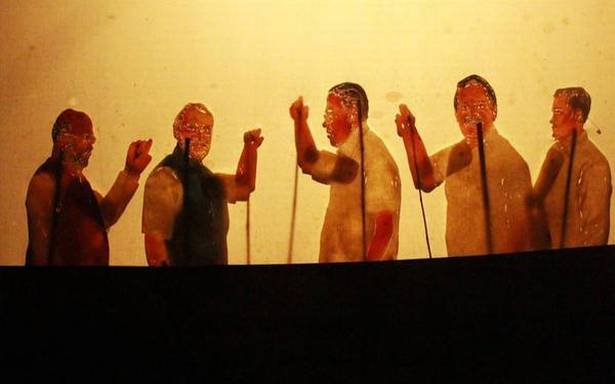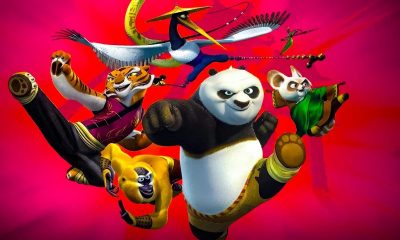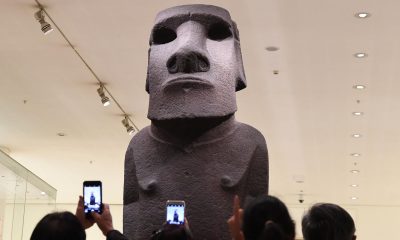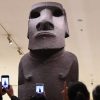ART NEWS
KK Ramachandra Pulavar expands the scope of ‘tholpavakoothu’
The Padma Shri recipient addresses socio-political issues and contemporary themes through the ancient art form
Tholpavakoothu (shadow puppetry), a centuries-old art form from Kerala bridged the past and present with a one-hour recital that showcased the story of coir in the State. KK Ramachandra Pulavar’s tholpavakoothu show was part of the recently held Coir Kerala 2021, in Alappuzha. The performance with leather puppets examined the place of coir in the socio-economic history of Kerala, the struggles and difficulties of coir workers and various schemes implemented by the Government of Kerala over the past four-and-a-half years that help the coir industry which was in tatters for various reasons.
A representation of COVID-19 awareness through tholpavakoothu
| Photo Credit:
Special arrangement
Pulavar, a Padma Shri recipient this year, explains that they had to make new puppets for putting up such shows themed on contemporary events. So leather puppets representing Kerala’s Chief Minister Pinarayi Vijayan and Finance Minister Thomas Isaac had to be made along with those of coir workers, coir traders, machines for twisting the coir into ropes and so on. Realising the importance of broadening the thematic content of the heritage art form, Pulavar has been at the forefront of choreographing, writing and developing contemporary themes in tholpavakoothu. “Unlike the narrative in a mixture of Tamil, Malayalam and Sanskrit in the ritualistic shows that we perform in about 85 temples from January to May, the new ones are in simple Malayalam. Even for shows staged outside the precincts of temples, I prefer using simple Malayalam to the traditional narratives. Such shows are able to capture the viewers’ attention when we speak in a language that is familiar to them. I also made the movements a little more dramatic to reach out to the audience,” explains Pulavar.
Right from new puppets and shows to awareness programmes on COVID-19 to performances themed on the Panchatantra, The Mahabharatha and legends of Lord Ayyappa, Mahabali and The Bible (Yesukoothu) have been developed by Pulavar. Shows based on the life of Buddha and Gandhi have also been staged at many venues in India and abroad with naratives in Hindi and English.“Tholpavakoothu in temples focusses on the rendering of The Ramayana from Kamba Ramayanam. The tholpavakoothu performance at temples lasts for 10 hours. It goes on for 21 days at the Devi temple in our village in Koonathara, Shornur (Thrissur district),” he elaborates. Narratives of yore He emphasises that all ritualistic performances in temples follow the traditional narratives of his ancestors. Performing since the age of six, Pulavar says that 13 generations of his family have been staging performances and making the distinctive leather puppets. “I have been a performer for 50 years now. Having learnt the art form from my late father Krishnakutty Pulavar, I have also been lucky to observe, learn and perform with maestros in the field such as the late Uppathu Narayanan Nair and Balan Nair,” he explains. Dedicating the Padma Shri to their memory, perseverance and hard work, he says he owes the honour for carrying on with the art form even in the face of great odds, to them. He points out that this is the first time a tholpavakoothu performer has been honoured with a Padma award.
A scene from one of the stories from the Panchatantra performed by Tholpavakoothu exponent KK Ramachandra Pulavar
| Photo Credit:
Special arrangement
“Right from the time man observed shadows, this form of performance has existed in many forms and it is perhaps one of the oldest forms of storytelling. It is the percusor of cinema. Is it any surprise that the logo of the International Film Festival of Kerala is that of a tholpavakoothu puppet? I see the Padma Shri as an honour for every tholpavakoothu performer,” he asserts.He recalls a period when there were limited opportunities and hardly any audience turning up to watch their evocative performances even in temples. “There was a period when puppetry was in doldrums but there has been many positive changes over the last couple of decades. My predecessors democratised the art form and popularised it. Once staged only in temples, they gave it a bigger audience by putting up by plays outside temples. There have been revolutionary changes in the themes we take up. We have choreographed performances based on the socio-political developments of Kerala,” he says. Pulavar’s three children, Rajeev, Rajitha and Rahul are also following in their forefathers’ footsteps. While Rajeev is working with his father, Rahul is working on his doctorate in Assam University while Rajitha is perhaps the only woman performer in the field. A recipient of the junior fellowship of the Kerala Folklore Academy, she is the only woman tholpavakoothu performer to have won the Yuva Prathibha award of the Academy. “Rajitha’s dream is to form a troupe consisting of only women and choreograph plays that highlight stories with an accent on women. She has given a feminine touch to the art form,” adds Pulavar.











